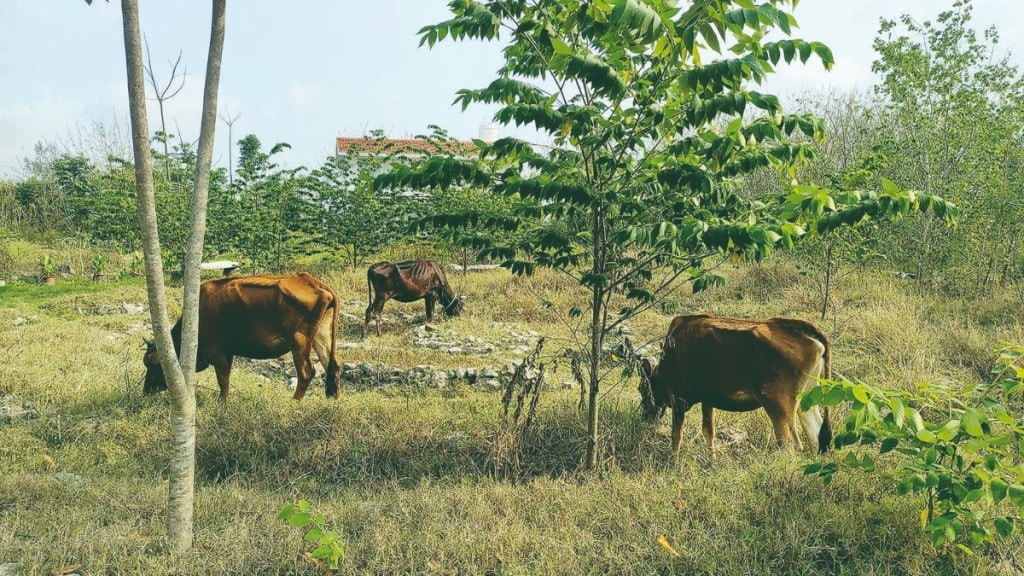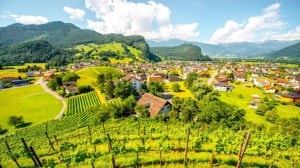Rolling open spaces, blue skies, clean air, organic food, a slow and simple life, but without Wi-Fi or the complexities of an urban jungle—is that your idea of an idyllic escape from the hustle and bustle of city life? Then farm stays could be the right mode of vacation for you. A concept that became significantly popular during the Covid-19 pandemic, farm stays are much in demand now, as they not only help you to relax and rejuvenate but also to reconnect with rural heritage and the origin of your food supply. “There has been a surge of customer interest in farm stays as a unique holiday experience,” says Daniel D’Souza, president and country head—holidays, SOTC Travel. “In fact, we are witnessing an approximately 20% rise in demand versus last year across our customer segments, especially multigenerational families,” he adds.
Not only farm stays in particular, but the concept of agricultural tourism or agritourism is “gaining significant popularity”, and will gain traction in the future too. “The market is expected to grow at a 19.9% CAGR from 2023 to 2028,” says Rikant Pittie, co-founder of EaseMyTrip.
Among the prominent reasons behind the traction are a fast-paced urban life and pollution that are pushing city-dwellers to escape their mundane routine and undertake farm vacations. What they get include organic produce, clean air, scenic beauty, serenity and recreational activities like village tours, harvest festivals, a day in the fields, shopping for local produce and handicrafts and experiencing authentic rural life closely, but at economical rates, which are major attractions for travellers to plan farm vacations, as per Pittie.
There is much on offer here, spanning from stud and dairy farms to bees and large-scale agricultural farms. The most popular destinations for such a stay are Kerala, Punjab, Nagaland and Maharashtra. At the same time, Surjivan in Gurgaon, Prakriti Farms in Punjab, Bon Farmhouse in Sikkim and Farm of Happiness in Maharashtra are the most in demand.
While tourists have much to gain from the experience, farmers, too, are benefitted. “Farm stays play a crucial role in bolstering India’s agritourism sector, offering farmers an avenue to generate extra income while providing tourists with an immersive taste of rural life,” says Pittie. Hence, they have been steadily gaining popularity since the 1980s, initially in Italy and now globally, indicating their growing significance in the agritourism industry. These endeavours help farmers diversify their income streams, reducing their reliance on unpredictable agricultural earnings while enriching the overall agritourism experience,” he adds.
Earthen pots & earthy flavours
The Western Ghats. An abundance of flora and fauna. Groves of coconut, betelnut, banana, spices, mangoes and medicinal plants all around. A stream flowing nearby, and a rich, rustic village life. What more can one ask for?
This might feel like a dream, especially for the city folks, but it is the experience offered by Maachli, a farm stay located in Maharashtra’s Sindhudurg. “What started as a fulfilling and satisfying retirement plan of my parents blossomed into a full-fledged, self-sustaining initiative,” says Prathamesh Samanth, who runs the farm stay with his parents, Pravin and Priya Samanth.
The cottages here are conceptualised as Maachli, huts in farms where the farmers rest and protect their produce. Not only is Maachli endowed with abundant greenery, but an “astounding” water stream flows through the farm serving as “one of the main attractions”. “Guests enjoy doing a fish pedicure or simply floating on a water raft post-monsoon,” says Samanth. The dense plantation and the stream have led to the creation of a micro-climate, he adds.
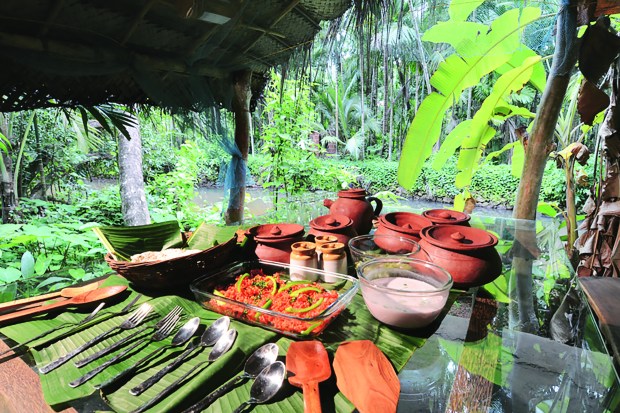
The Samanths also offer a unique culinary experience, where the focus is on the Saraswat cuisine. The food is prepared by the owner Priya Samant herself, as she strives to introduce some long-forgotten recipes of Saraswat cuisine. “In our dining area called Pavhner, food is served on leaf plates. Earthen pots are used to serve food. We serve both vegetarian and non-vegetarian food with the best combinations, considering the availability of the same. All the vegetables served here are organic and grown in the village itself. The Chool (mud stove) is used for cooking, which imparts a distinct flavour to the food,” says Samanth. Also, raw materials such as fish, groceries, vegetables, and fruits are sourced from the villagers.
The majority of Maachli’s clientele comprises urban-dwellers looking for a break from their frantically-paced lives in cities such as Mumbai, Pune, Delhi, Bengaluru, Hyderabad, Ahmedabad, etc. The Samanths played hosts to none other than ace cricketer Sachin Tendulkar, who celebrated his 50th birthday at Maachli, earlier this year.
The farm stay also caters to a foreign clientele, who generally arrive from November to February and make up 5-6% of its total clients. A night’s stay at this Konkan farm stay costs around Rs 11,700 (for double occupancy, including breakfast, lunch and dinner). “However, the luxury at Maachli is in the concept, ecosystem, experience and an idyllic village life. Our role is to help guests unfold it,” adds Samanth.
Heritage, havelis & a rustic charm
Most people flock to Rajasthan for the royal heritage experience. However, despite being a desert state, it has another experience to offer, in the form of farm stays.
Just a 15-minute drive from the Jaipur airport will take you to The Bagheera, a boutique farm stay in Jagatpura. While it is a farm, a haveli is at the centre of it, providing what the state offers the best while spicing it up with rustic charm.
“The Bagheera is seemingly a new project,” says its managing director Swaraj Singhi. “Although we bought it last year for our personal use, upon setting it up and beautifying the space, we realised the place had so much more to offer. That is when we decided to start a farm stay here,” he shares.
Interestingly, The Bagheera is named after “the majestic Indian black leopard”, who serves as friend, protector and mentor to the man-cub Mowgli. “And since we share the vicinity with the royal leopards of Jhalana, we decided to name our farm The Bagheera Heritage,” says Singhi.
While the haveli offers an old-world charm, “the horses and the dogs only add to the naturally existing flora and fauna of the farmland,” the MD says. A “paradise” for bird-watchers, “one can easily spot 15 varieties of birds by just taking a stroll through the property,” he says. To add modern amenities to the mix, the farm stay also features a swimming pool, 11 stables, a paddock, an outdoor fireplace, and gardens spread across this 50,000-sq-ft space.
Location plays a prominent role here. “Having the property so close to the main city, yet surrounded by jungle and grazing land, allows guests to feel as if they are outside the city. The property’s location is such that the last stretch of road gives one the notion of entering a rural space, but as soon as you enter the property, it is a green spread of land with humongous gardens comprising a mystique heritage structure,” says Singhi.
What is a farm without its freshly-sourced, deliciously earthen food? While offering an authentic taste of rural Rajasthan with fresh, locally sourced ingredients, The Bagheera also provides “an experiential outdoor cooking set-up where guests can also try their hands on cooking local delicacies.”
Since starting in November last year, it has catered to around 50 bookings, where the average expenditure is approximately Rs 20,000 per couple/room per night, including F&B. Since The Bagheera is an undivided stay property with five rooms, only a group or couple gets the entire property for the stay. “To maintain the exclusiveness of the stay, we don’t entertain a mixed crowd or give rooms to different groups or individuals. We prefer non-local over local guests and restrict it for youngsters who come only with an agenda of partying to maintain the tranquillity and calmness of the space,” the managing director says.
Last fiscal, it clocked a revenue of Rs 21.6 lakh, in five months since starting in November. The profit stood at 40%. Expecting major growth, “our target for this year is Rs 75 lakh, and we are positive about achieving it with the number of bookings we have during the peak season, which is from October to February. And we will make a profit of Rs 32-35 lakh after taxes,” he shares, reflecting growth in business, along with the demand for the farm experience among tourists.
Learnings & legacies on the west coast
While scores of people flock from villages to cities for what is thought to be a better life, journalist Jharna Thakkar and advertising professional Rohan Fernandes looked the other way, “to bring about some sort of balance”. And hence was born Fernandeswadi.
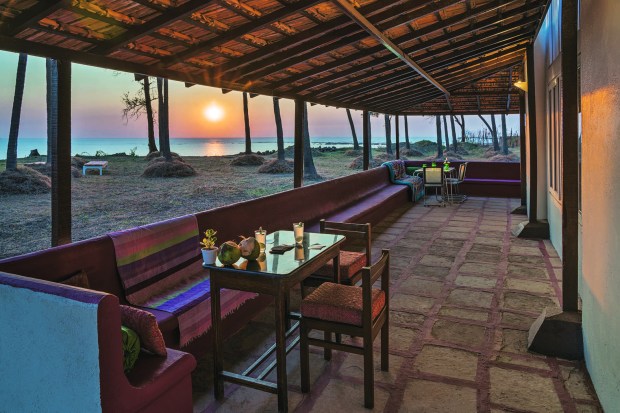
Located in coastal Maharashtra at Uran, the farm stay is built on a piece of land owned by Fernandes’ grandfather. “So, it was only natural for us to build on his legacy,” says Fernandes. And for that, the duo trained on a self-sustained farm in Switzerland to learn the basic principles of growing, harvesting and preserving food. “Since we are located directly on the sea, coconut is our main produce. But we also grow vegetables, mangoes, bananas, papayas and other such fruits. We encourage our guests to come to our farm tours, walk with us, harvest their own food, and during that time, we tell them the secret of the trees, and everything else that we have learned,” he says.
The attempt here is to offer a slow life, “a space that harks back to our grandparents’ generation, of communities and conversations. We have no TVs or Wi-Fi, however, we do have modern comforts such as ACs, geysers, etc,” they say.
The food at Fernandeswadi, too, exudes the essence of India’s western coast, “a mashup of our family recipes, spanning the west coast of India, from my ancestral Kutch to Rohan’s Goa”, as per Thakar. “I call it west coast cuisine as it is heavily influenced by coastal produce, and recipes from Gujarat to Goa, including Konkan Maharashtra, which is where Uran is situated,” adds Thakkar, who personally curates and cooks each meal for the guests, depending on their preferences and dietary restrictions. The produce is also largely sourced from their farms, or from the neighbouring farmers. “We also practise hyper-seasonality. So, we serve produce and seafood of the week, or the month, in a table-of-the-host format.
When they started in January 2019, the expectation was that it would appeal to a lot of mid-level professionals from Mumbai. “But over time, our guests ranged from well-known directors and lawyers to equally well-known actors and artistes. They love to come here with their families, sit by the sea front, listen to the birds, and enjoy good food and company. Summers also bring in a fair number of expats. I think guests also prefer us for their small, intimate reunions and get-togethers. But our favourites are the Waldorf school kids who often end up teaching us a thing or two,” says Fernandes.
Although Covid was a tough period for the farm stay, things have picked up since then.
“Our occupancy was 25% when we started off, which has now grown to about 60% on average,” he says. “We are busiest on weekends, but post-Covid, with work-from-home becoming common, weekdays have also started picking up. What we have experienced is that instead of spending on a party or an expensive meal, people are now choosing to spend their special occasions with us, at the same cost, if not less,” adds Thakkar.
Age-old recipes & a remote getaway
Age is just a number, as they say, and proving that right are 90-year-old Lakshmi Ammal and her 72-year-old daughter Kasthuri, who run Vaksana Farms near Chennai in Tamil Nadu.
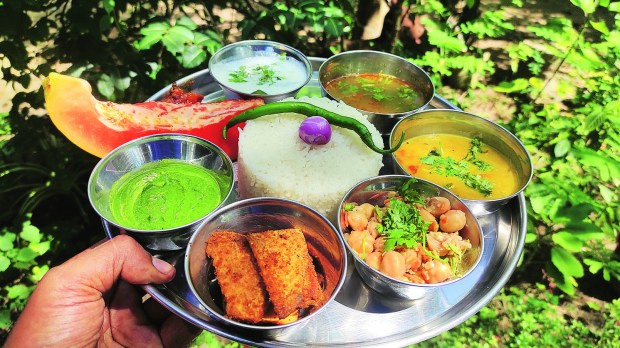
Vaksana, started during the pandemic, is a 13-acre permaculture, organic farm, in the middle of which are four farmhouses—Pico, Tang, Nest and Coop. Each of the houses is located in a different part of the farm, and cocooned by greenery in such a way that one is unable to see the other houses.
The duo term the guests’ response so far as “phenomenal”. “The weekends are booked out a few months in advance. Most guests hail from cities such as Chennai, Bengaluru, Hyderabad, Delhi and Mumbai. About 20% of guests are foreigners. It is clear that people want a break from the concrete jungles and spend a few days among greenery and peace,” they say.
The journey hasn’t been any short of being phenomenal either. “I grew up in a very conservative, patriarchal family in a small village in Tamil Nadu,” shares 90-year-old Lakshmi. “Married at a young age, I eventually had three kids. We hail from an agrarian family, and farming was our main source of income. Sadly, 37 years ago, my husband passed away, and a decade later, I lost both my sons. I lost all the men in my family, and hence the earning members. To make a living, I made masala powder, papadams and candles. I would struggle to make ends meet. One of my biggest strengths is my cooking and knowledge of traditional recipes, which I learned from my grandmother,” she shares.
“Two years ago, my grandchildren helped set up the farm stay, where I showcase my cooking to the guests,” she adds.
“After the demise of my father and two brothers, I have seen my mother struggle. I have been her only child and have wanted to take good care of her. Today, my greatest joy is to work closely with her every single day,” says Kasthuri.
The biggest strength of the farm stay remains its authentic rural vegetarian cuisine. “The recipes are age-old that I learned from my great-grandmother. Many of the guests love the taste, and they always come to me and ask for recipes,” shares Lakshmi.
Its strength also lies in the fact that it still remains a farm. “We do not want to turn Vaksana into a mini resort. The farming activities will always take higher prominence than the farm stay. This is what makes the stay here unique. Guests get to experience authentic farm life. They can participate in farming activities such as ploughing, weeding, fertilizing, harvesting etc. Our farm is an integrated farm, and we have lots of farm animals. We have cows, calves, ponies, sheep, goats, rabbits, guinea pigs, puppies, dogs, pigeons, chickens, turkeys, guinea fowls, ducks and swans. Families who stay at the farm love to interact and take care of the farm animals. We have three large ponds filled with rainwater to swim in. We have a pump-set which is such a pleasure to bathe under,” the mother-daughter duo shares.
The farm’s remote location, too, plays a role. “It is 2 km from the closest village. Guests appreciate the aloofness and the peace and quiet that it brings. Once inside the 13-acre farm, all you hear are the birds chirping and the cows mooing,” they say.
Spending a day at Vaksana costs Rs 8,000 on weekends and Rs 7,000 on weekdays. “We are proud of running a profitable business at such an old age. This gives us a tremendous sense of self-worth,” they add.
Tractor rides & charpoy comfort
While Punjab has much to offer—in the form of its decadent cuisine, a rich culture and solid history—its farms, too, have been an intrinsic part of its identity.
Set amidst a working farm near Amritsar and offering an authentic flavour of farm life is Punjabiyat. “With this farm stay, we wanted to showcase the farm life for which Punjab is known worldwide,” says Ashish Bhatia, founder and director of Itmenaan Lodges, of which Punjabiyat is a brand.

Punjabiyat exudes from several aspects of this farm stay—from architecture, which “takes inspiration from the local architecture of Punjab that goes back to the Harappan times” and artifacts displayed in the cottages that “reflect the local ethos” to activities like “tractor rides, visit to a local dairy to milk buffaloes, and to the local gurdwara for ardas”, which allow travellers to completely submerge in the Punjabi experience. “Once you are inside the cottage, you can see the vast expanse of the farm in front of you. There is a small plunge pool that takes inspiration from the agricultural pumps one finds across farms in Punjab. Our guests can participate in farming and can also visit a dairy farm nearby,” says Bhatia.
No Punjabi experience is complete without the food. “Our chefs make terrific Punjabi food, including parathas, makki ki roti, saag, gajar halwa and non-veg tandoori dishes. However, since our clientele comprises a sizable number of foreigners, who look for western dishes, our chefs have been trained in both Punjabi and western cuisines. Not only food, but the place also matters here. We serve breakfast atop a terrace from where our guests get splendid vistas of the farms all around,” Bhatia says.
Speaking of clientele, the founder-director says they are chiefly from Mumbai, Delhi and Bengaluru, while 20% of the guests are NRIs and foreigners. Staying at Punjabiyat costs Rs 8,000 per night, including breakfast.
According to Bhatia, the busiest period spans from October to March. “During this period, we have an occupancy of 75% plus. Long weekends get sold out months in advance.” Punjabiyat is currently closed as it is adding more cottages. “Currently, we have four cottages and were unable to keep up with the demand. We will restart next year with 12 cottages,” the founder says.
Running a farm stay “is not as lucrative as some other businesses, the reason being Punjab is a six-month destination. One of the reasons we are expanding is to be able to get more locals and be able to do small functions like ring ceremonies, birthdays, rokas, etc. This way, we will be able to run the farm stay for the entire year,” adds Bhatia.
